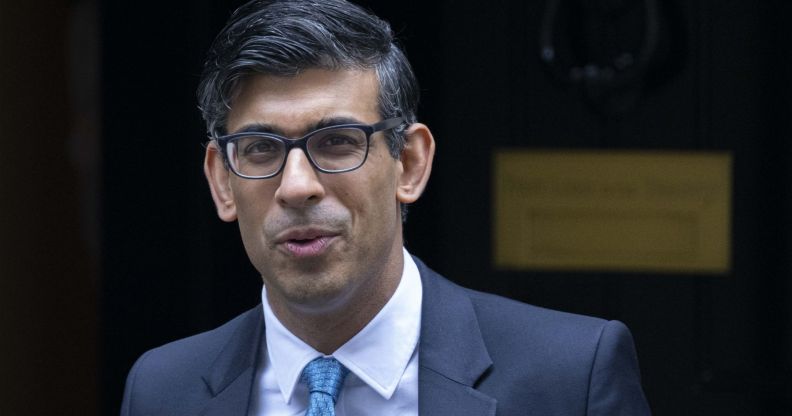Tory government gives update on long-overdue conversion therapy ban

Draft legislation is expected to be published later this year. (Getty)
Amid criticism of its continued delays on banning conversion therapy, the UK government has confirmed draft legislation will be published by the autumn.
Victor Madrigal-Borloz, a UN independent expert on violence and discrimination based on sexual orientation and gender identity, confirmed that he had met with the government and discussed its failure to so far ban conversion therapy, something first promised under Theresa May in 2018.
In his report, published on Thursday (11 May), Madrigal-Borloz said it was “perplexing” that the government had taken this long to draft a bill considering the “significant support” banning conversion therapy has among MPs.
He said the government confirmed to him that it had “finalised consultations in relation to draft legislation for England and Wales, and that it is committed to publish the draft legislation for pre-legislative scrutiny in the current parliamentary session (ending in autumn 2023)”.
Madrigal-Borloz also noted in his review that the government of Wales had “indicated concerns” about the UK government’s treatment of the conversion ban, adding that it had “left all of the devolved administrations waiting for updates without operational solutions to ongoing human rights violations”.
The report went on to say: “The Welsh government indicated it was anyhow proceeding with the rollout of support services for survivors through a programme to be launched in September 2023, noting correctly that government authorities can proceed with meaningful policy measures.”
Scotland is legislating its own conversion therapy ban. The UN expert noted its approach will include both “protective measures and prohibitions”.
Conversion therapy refers to attempts by individuals or organisations, typically for religious purposes, to forcefully change a person’s sexuality – something all major UK medical organisations agree is impossible.
The Tories first pledged to ban this abuse in 2018 under Theresa May.
Boris Johnson inherited this pledge, announced he would not move forward with a legislative ban, then almost immediately U-turned, promising a ban that covered conversion therapy on the basis of sexuality only.
Rishi Sunak has since committed to a trans-inclusive ban, but the lack of movement has been condemned by several LGBTQ+ activist organisations and human rights groups.
Following the UN expert’s visit, leading anti-conversion therapy campaigner Jayne Ozanne told PinkNews she was “incredibly grateful” for his “hard hitting statement”.
“His comments are excoriating, especially of the EHRC and their recent letter regarding the Equality Act as well as the government’s procrastination on making good their promise on banning conversion practices,” she added.
“For a UN Human Rights Expert to openly admit to being so shocked is deeply embarrassing for the government and should be a major wake-up call to all who care about equality, fairness and decency in modern day Britain.”
UN expert expresses ‘deep concerns’ for LGBTQ+ rights in the UK
During his visit, Madrigal-Borloz expressed deep concern about rising anti-LGBTQ+ rhetoric in the UK, which he said had been fuelled by “toxic public debate”.
He said the rhetoric contributed to “biased-motivated incidents of harassment, threats and violence against LGBT people,” which included the “rampant” surge in hate crimes.
“All of this – by a wide range of stakeholders – is attributed to the toxic nature of the public debate surrounding sexual orientation and gender identity,” he added.
Specific concerns included issues around NHS waiting times for gender-affirming care patients and the advice from the UK’s Equality and Human Rights Commission (EHRC).
Madrigal-Borloz said he was “shocked” to hear that the EHRC had issued advice on to redefining the word “sex” in the 2010 Equality Act to mean “biological sex”.
That surprise was exacerbated after he was told by an EHRC commissioner that the recommendations were given without an explicit definition as to what “biological sex” means.
“The independent expert is of the opinion that this action of the EHRC is wholly unbecoming of an institution created to ‘stand up for those in need of protection and hold governments to account for their human rights obligations’,” the report said.

